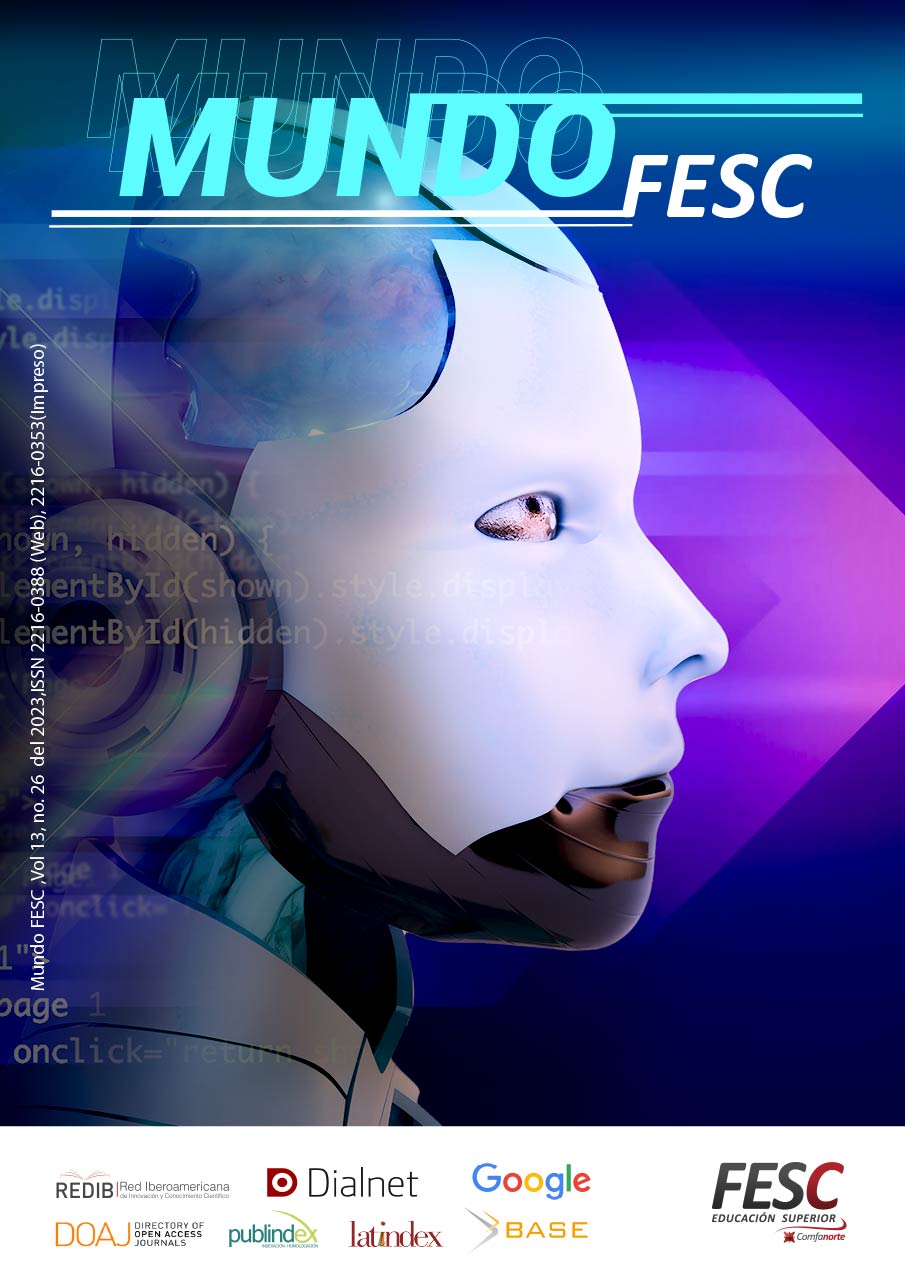La inclusión al sistema financiero de los negocios informales de la ciudad de Cúcuta
DOI:
https://doi.org/10.61799/2216-0388.1522Palabras clave:
Inclusión financiera, sistema financiero, economía informal, educación financieraResumen
Los negocios informales son actividades económicas que no se encuentran registradas ante las autoridades de registro empresarial, entes fiscales y reguladores, además que la gestión contable y financiera es escasa y los trabajadores usualmente no tienen un contrato formal de trabajo. El objetivo es proponer estrategias para incluir a los negocios informales de la ciudad de Cúcuta en el sistema financiero. La metodología se basa un enfoque cuantitativo y de tipo descriptivo, donde la población está conformada por los negocios informales que están ubicados en la zona centro entre las calles 6 y 10 y entre las avenidas 0 y 6. El muestreo es probabilístico y se utiliza una ecuación de población infinita porque no hay datos oficiales sobre el censo requerido, lo que da como resultado 138 personas a encuestar. El instrumento consiste en un cuestionario adaptado de la caracterización de negocios informales desarrollado por la Cámara de Comercio de Bogotá en 2018. En los resultados se presenta la caracterización de estos negocios informales según las condiciones personales y socioeconómicas, así como información sobre el tiempo en la actividad, el espacio físico donde se ubica, la propiedad sobre el local, el número de propietarios y las motivaciones para ejercer la labor. Seguidamente, se determinan los factores críticos y las variables que influyen en la inclusión financiera, lo cual se toma como marco de análisis para estructurar una propuesta que ayuda a fomentar la educación, la asesoría y la colaboración institucional, incluyendo a entidades bancarias, universidades y de fomento empresarial. Se concluye que esta problemática requiere de la adopción de un enfoque integral donde intervenga el ámbito educativo y el financiero al mismo tiempo, para garantizar que los negocios se formalicen y se mantengan en el camino del crecimiento y el cumplimiento de la normatividad vigente.
Descargas
Referencias
[1] Banco Mundial, “La inclusión financiera es un elemento facilitador clave para reducir la pobreza y promover la prosperidad”, 2022. [En línea]. Disponible en: https://www.bancomundial.org/es/topic/financialinclusion/overview
[2] Organización de las Naciones Unidas, “La Inclusión Financiera Para la Inserción Productiva y el Papel de la Banca de Desarrollo”, 2018. [En línea]. Disponible en:https://doi.org/10.18356/54001064-es DOI: https://doi.org/10.18356/54001064-es
[3] Organización Internacional del Trabajo, “La economía informal emplea más de 60 porciento de la población activa en el mundo”, 2018. [En línea]. Disponible en: https://www.ilo.org/global/about-the-ilo/newsroom/news/WCMS627202/lang--es/index.htm#::text=Econom%C3%ADa%20informal-,La%20econom%C3%ADa%20informal%20emplea%20m%C3%A1s%20de%2060%20por%20ciento%20de,y%20los%20pa%C3%ADses%20en%20desarrollo
[4] M. Torres, W. Diaz y B. Rolón, “Impacto económico laboral en la ciudad de Cúcuta por migrantes venezolanos”, Revista Investigación & Gestión, vol. 6, no, 2, pp. 87-96, 2023
[5] Departamento Administrativo Nacional de Estadística, “Medición de empleo informal y seguridad social Trimestre móvil febrero - abril 2022”, 2022. [En línea]. Disponible en: https://www.dane.gov.co/files/investigaciones/boletines/ech/echinformalidad/bolgeihinformalidadfeb22abr22.pdf
[6] C. Cano, M. Esguerra, N. García, L. Rueda y A. Velasco, “Inclusión financiera en Colombia”, 2021. [En línea]. Disponible en: https://repositorio.banrep.gov.co/bitstream/handle/20.500.12134/6618/6.%20Inclusi%C3%B3n%20financiera%20en%20Colombia.pdf?sequence=2&isAllowed=y
[7] L. Peñaloza, “El Impacto del Éxodo Migratorio de venezolanos sobre los Salarios reales en Colombia”. Buenos Aires: Universidad Nacional de La Plata, 2019
[8] M. Rubira, “Desempleo y actividad económica en Uruguay: ¿una relación no lineal?” Montevideo: Universidad de la República, 2020
[9] K. Vásquez y C. Vásquez, “La informalidad y la evasión tributaria en las MYPES del distrito de Santo Tomas, Cutervo, Cajamarca”. Lima: Universidad Cesar Vallejo, 2022
[10] D. Pérez, “¿Las transferencias condicionadas generan incentivos a la informalidad?”. Bogotá: Universidad de los Andes, 2018
[11] Y. Uyabán y G. Ruiz, “El problema de los vendedores ambulantes o informales del barrio El Restrepo en la ciudad de Bogotá, D.C”. Bogotá: Universidad La Gran Colombia, 2018
[12] M. Bolívar, “La informalidad laboral femenina en Colombia: un análisis sobre su composición y determinantes socioeconómicos”. Bogotá: Universidad Nacional de Colombia, 2021
[13] R. Hernández, C. Fernández y P. Baptista, “El método de investigación”. México: McGraw-Hill, 2014
[14] M. Tamayo, “El proceso de la Investigación Científica”. México: Limusa, 2014
[15] Cámara de Comercio de Cúcuta, “Encuesta sobre la informalidad”, 2014. [En línea]. Disponible en: https://datacucuta.com/estudios-sectoriales/informalidad/encuesta-sobre-la-informalidad/
[16] Departamento Administrativo Nacional de Estadística, “Mercado laboral Cúcuta AM. noviembre 2020 – enero 2021”, 2021. [En línea]. Disponible en: https://www.dane.gov.co/files/investigaciones/planes-departamentos-ciudades/210319-Mercado-laboralCucuta-AM.pdf
[17] Federación Nacional de Comerciantes Empresarios, “Notícias de Fenalco Antioquia”,2021. [En línea]. Disponible en: https://www.fenalcoantioquia.com/blog/entrediciembre-de-2020-y-febrero-de-2021-la-informalidad-en-colombia-llego-a-481/
[18] A. Santana, “Muestreo aleatorio simple”, 2023. [Online]. Disponible en: https://estadisticadma.ulpgc.es/MGC/muestreoAleatorioSimple.html
[19] L. Naranjo, Y. Calderón y M. Espinosa, “Importancia de la educación financiera para las micro y pequeñas empresas en un municipio del sureste de México”, Revista de Investigación Académica Sin Frontera: División de Ciencias Económicas y Sociales, vol. 4, no. 39, pp. 236-289, 2023. doi: /10.46589/rdiasf.vi39.547
[20] Consultorio Financiero, “Escuela de Finanzas, Economía y Gobierno. Universidad EAFIT”, 2023. [En línea]. Disponible en: https://www.eafit.edu.co/escuelas/economiayfinanzas/Paginas/consultorio-financiero.aspx
[21] E. Pixelpro, “Clínica Jurídica Empresarial y del Emprendimiento”, Bogotá: Universidad de Los Andes, 2023. [En línea]. Disponible en: https://derecho.uniandes.edu.co/uniandes-y-ccb-se-unen-para-resolver-dificultades-juridicas-de-emprendedores-yempresarios/
[22] Bancamia, “Información institucional”, 2023. [En línea]. Disponible en: https://facilitamossuprogreso.bancamia.com.co/
[23] Banco de Bogotá, “Educación Financiera más Interactiva”, 2023. [En línea]. Disponible en: https://www.bancodebogota.com/wps/portal/banco-de-bogota/bogota/nuestra-organizacion/sala-de-prensa/2019/educacion-financiera-interactiva
[24] Banco Bilbao Vizcaya BBVA, “BBVA presenta su Plan Global de Educación Financiera hasta 2025. BBVA Noticias”, 2023. [En línea]. Disponible en: https://www.bbva.com/es/sostenibilidad/bbva-presenta-su-plan-global-de-educacion-financiera-con-elobjetivo-de-formar-a-un-millon-de-personas-hasta-2025/
[25] El Economista, “Dispositivos móviles, una llave para la educación financiera”, 2019. [En línea]. Disponible en: //www.eleconomista.com.mx/finanzaspersonales/Dispositivos-moviles-una-llave-para-la-educacion-financiera-20191014-0008.html
Descargas
Publicado
Número
Sección
Licencia
Derechos de autor 2023 Mundo FESC

Esta obra está bajo una licencia internacional Creative Commons Atribución-NoComercial 4.0.






